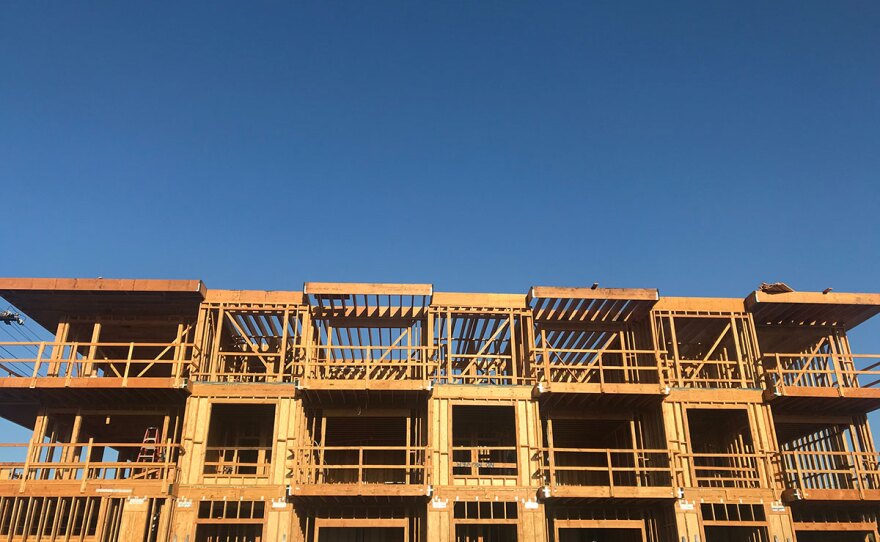California lawmakers Monday revived a hotly contested bill that aims to tackle the state's dual crises of housing scarcity and climate change, offering new amendments intended to appease critics in local government.
Senate Bill 50, authored by Sen. Scott Wiener (D-San Francisco), would require cities and counties to allow denser and taller apartment buildings in areas close to public transit stops and major job centers. It has been on hold since it was blocked in committee last year.
Now, as the legislature enters its 2020 session, the bill faces a Jan. 31 deadline to pass the Senate floor.
California YIMBY, the pro-growth advocacy group that is sponsoring SB 50, said the bill would help the state achieve its climate goals by reducing commute distances and allowing more people to live within walking distance of rail and bus stops.
"Californians are fleeing out of the state, largely to places like Texas, Nevada and Arizona, because the cost of housing is just too high," said Brian Hanlon, the group's executive director, in a conference call Monday with reporters. "When they go to places like those states, their greenhouse gas emissions skyrocket and they also have less access to economic opportunity."
RELATED: Atkins Will Be ‘Really Involved’ In Resurrection Of Housing Density Bill
But the fierce opposition to the bill is likely to continue. Livable California, a group that formed recently to oppose SB 50 and other state initiatives to increase housing density, said the bill was "fatally flawed," would harm the character of low-density communities and push low-income residents from their neighborhoods.
"We do need affordable housing, not the luxury housing his bill would stimulate," said Rick Hall, Livable California's chairman, in an email to KPBS.
The most significant amendment to the bill allows a city or county to delay its implementation for up to two years if they approve a locally crafted alternative that would achieve the same goals of boosting home building and reducing car travel.
Wiener said he did not expect the potential delay in the bill's implementation to have a dramatic effect on the state's housing market.
"Housing does not get built overnight," he said. "Cities will know what's coming, and you'll see a lot of work being done to prepare for that two-year period."
If a city takes advantage of the two-year delay in the bill's implementation, the state Department of Housing and Community Development would have to verify that the city's alternative zoning plan would result in at least the same number of additional homes.
RELATED: State Officials Praise SANDAG’s Housing Plan
Prior to the latest round of amendments, SB 50 had already undergone a host of changes. They include:
— More modest zoning changes in counties with populations of 600,000 or less.
— Exemptions for coastal cities with fewer than 50,000 people.
— Prevents developers from using the law to demolish buildings recently occupied by renters.
— A five-year delay for sensitive communities at risk of gentrification.
— A requirement that developers set aside a portion of their homes for low-income households.
The bill’s survival in 2020 will depend on the level of support it receives from legislative leaders and Gov. Gavin Newsom. Senate President Pro Tem Toni Atkins (D-San Diego) said last year she would have voted in favor of SB 50 had it reached the Senate floor, but she declined to intervene on the bill’s behalf when it was put on hold at the committee level.
Newsom has said he wants the legislature to pass more laws to stimulate home building, and he pledged in his campaign to work for the construction of 3.5 million homes across California by 2025. But he also declined to intervene on SB 50’s behalf last year and has not said whether he would sign it into law.
RELATED: San Diego Council OKs ‘YIGBY’ Reforms For Housing On Church Parking Lots
The bill is supported by a large and diverse coalition of groups representing businesses, developers, labor unions, retired people and students. It has also been endorsed by the mayors of San Francisco, San Jose, Oakland and Sacramento.
San Diego Mayor Kevin Faulconer has passed a number of local policies in line with SB 50's goals of adding housing near public transit stops. Still, he has avoided taking a clear position on the bill and did not respond to a request for comment on Monday.
Despite support from some big-city mayors, local governments have been among SB 50's strongest opponents. The League of California Cities opposed the bill last year, saying it would erode local governments' near-total control over land use.
Culver City Mayor Meghan Sahli-Wells, a supporter of SB 50, said Monday that California could not meaningfully address housing affordability or climate change with cities acting in isolation.
"We need a statewide strategy to address our housing crisis, and SB 50 is the bold yet nuanced path to achieving California's ambitious climate goals," she said.








